Sixth Annual Statewide Survey
The Sixth Annual Idaho Public Policy Survey was conducted November 29-December 3, 2020 and surveyed 1,000 adults who currently live in Idaho. The sample is representative of the state’s population both geographically and demographically. Survey responses were collected by phone (58%), online (32%), and via text message (10%). The survey addresses a variety of issues facing Idaho including growth, education, taxes, criminal justice, and the COVID-19 pandemic. The survey has a simple random sampling margin of error of +/– 3.1% and was conducted by GS Strategy Group.
Download a printable PDF of the 6th Annual SurveyRead the Sixth Annual Statewide Survey
Key Findings
- Despite the challenges of 2020, more Idahoans believe the state is headed in the right direction (49%) than on the wrong track (37%).
- Education remains at the top of the list of issues Idahoans want the Idaho Legislature to address in the coming year.
- A narrow majority (55%) of Idahoans report they would get a vaccine for COVID-19 if one were available today, while a sizeable minority (38%) say they would not get a vaccine.
- Among those who would not get a vaccine, the most common reasons are concern about side effects (45%), not believing they need it (27%), and wanting to know more about its effectiveness (23%).
- If the State of Idaho runs a budget surplus as is expected, people are divided on how to use that money, with tax relief being cited by the highest number (43%).
- Idahoans favor a criminal justice system that focuses on rehabilitation and education of offenders as opposed to punishment and lengthy incarceration.
- A majority of people in the state (76%) are confident in the security of Idaho’s elections.
For more information, visit: boisestate.edu/sps-ipi
The Idaho Public Policy Survey polled 1,000 Idahoans representing all of Idaho’s 44 counties.
Overview
This year’s survey begins by examining general beliefs about the state. Almost half (49%) of Idahoans believe the state is headed in the right direction, while 37% feel the state is on the wrong track. These numbers reflect a change in opinion compared to last year, when 56% of respondents felt Idaho was headed in the right direction. The majority of Republicans (61%) believe the state is headed in the right direction, compared with 51% of Independents and 27% of Democrats.
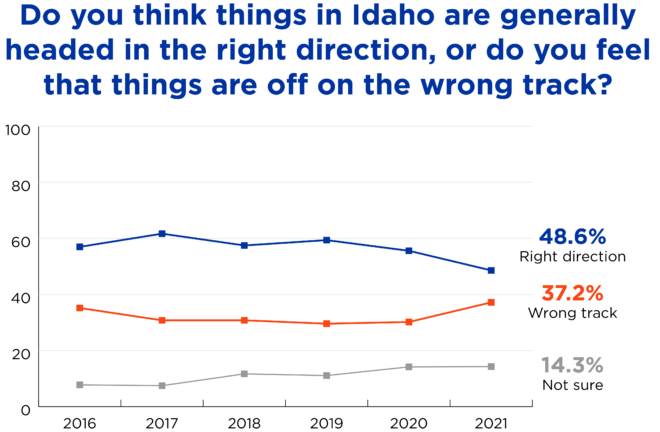
Respondents were asked to rate, on a scale from 1-10 (1 being not at all important and 10 extremely important) the importance of the Idaho Legislature addressing a range of different issues including education, transportation, housing, healthcare, COVID-19 response, taxes, the environment, and jobs and the economy. Respondents were not asked what kind of action they prefer, only which issues they see as more pressing.
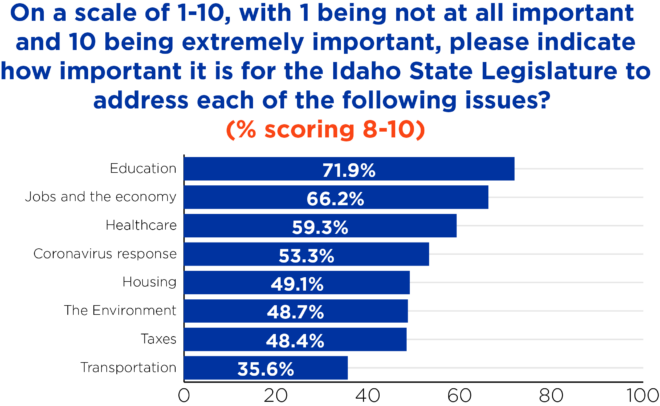
Education is the most important issue – 72% of Idahoans rate this issue as an 8–10. Education has consistently appeared at the top of this list in previous years as well. Last year, 75% gave the issue an 8–10. A sizeable majority of Democrats (81%) and Republicans (68%) rate the issue as having high importance.
The next most important issue is jobs and the economy, with 66% giving this issue an 8–10. This was also the second most important issue last year, when 64% rated it as an 8–10. As with education, this issue was rated as important by all partisan groups, with 71% of Republicans and 64% of Democrats giving it an 8–10.
Healthcare (59% rating as an 8–10) and the coronavirus response (53% rating as an 8–10) rank as the third and fourth most important issues for the Legislature to address. Larger partisan differences exist with these issues. Democrats rate both healthcare (80%) and the COVID-19 response (78%) as an 8–10, while Republicans express less urgency on both healthcare (51%) and the COVID-19 response (38%).
Less than half of Idahoans give an 8–10 rating on housing (49%), the environment (49%), taxes (48%), and transportation (36%). Democrats are more likely than Republicans to prioritize housing (61% vs. 43%), the environment (74% vs. 34%), and transportation (41% vs. 36%), while Republicans are more likely than Democrats to give an 8-10 rating for taxes (61% vs. 31%).
COVID-19
The survey included a block of questions about Idahoans’ experiences with, and attitudes about, the COVID-19 pandemic. Eight percent of respondents report testing positive for COVID-19, this is similar to the percentage reported by the State. Some respondents (15%) report that while they did not test positive, they believe they had COVID-19. The vast majority of Idahoans (77%) report not having had COVID-19.
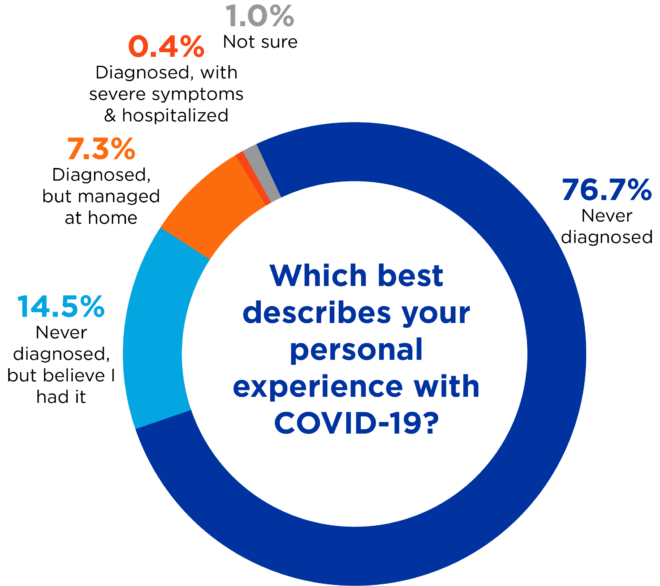
The majority of people in our sample report having friends and family who have tested positive for COVID-19. Almost half (44%) have 1–5 friends or family members who tested positive, 16% have 6–10 friends or family members who tested positive, and 14% report more than 10 friends and family members who tested positive. Twenty-six percent of people in the state report having no friends or family who have tested positive.
Respondents were asked how many days in the past week they felt anxious or stressed due to COVID-19. Almost half of respondents (47%) report no stress or anxiety related to the pandemic, and half (50%) report feeling anxious or stressed at least one day in the past week. Twenty percent felt anxious or stressed 1–2 days in the past week, 13% felt anxious or stressed 3–4 days in the past week, and 17% felt anxious or stressed 5–7 days in the past week.
While the pandemic may concern Idahoans for a variety of personal reasons, the survey asked Idahoans about three specific concerns for the state: negative impacts on the economy, health, and children’s education. People are divided on the most concerning elements of the pandemic, the largest number (38%) list economic impacts as their primary concern, followed by impacts on children’s education (31%), and health impacts (28%). Republicans are more likely than Democrats to be most concerned about the economy (46% vs. 21%) and effects on education (37% vs. 23%). More Democrats are concerned about health impacts of the virus than Republicans (52% of Democrats vs. 13% of Republicans).
When asked whether schools should operate all in-person, all online, or a mix of the two, 43% of Idahoan’s believe schools should offer a mix of instruction. Smaller groups believe instruction should be all in-person (33%) or all online (20%). Republicans are more likely to prefer in-person learning (50%) than a mix (36%) or all online classes (8%). Democrats prefer a mix of in-person and online (46%) as opposed to all online (37%) or all in-person (10%). Parents of children in K-12 schools are split between all in-person learning (42%) and a mix of in-person and online (38%), with 16% preferring all online.
Half of respondents were asked if they support a mask mandate. The other half were asked specifically if they support a mask mandate punishable by a fine. This allowed a comparison between general support for a mask mandate and the support for enforcement of a mask mandate.
Idahoans express majority support (58%) for a statewide law requiring masks in public places, while 41% oppose. There is intensity in these attitudes: 46% strongly support a mandate, 32% strongly oppose it, and relatively few somewhat support or oppose. Almost all Democrats (93%) support a mask mandate, while 39% of Republicans are in favor and 59% oppose.
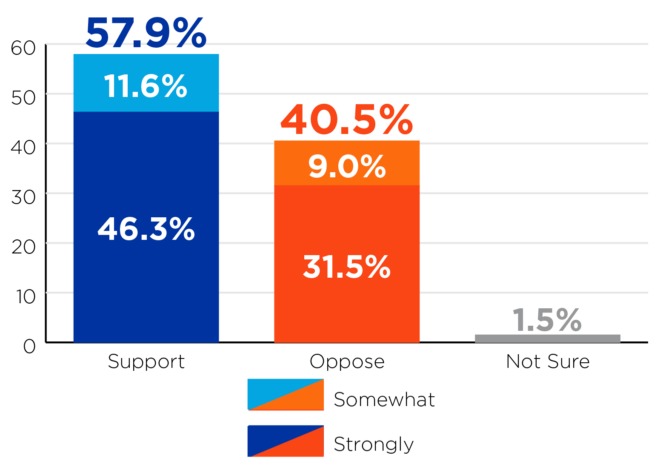
A slight majority (51%) support a mandate enforceable with a fine, and 46% oppose. The difference between these numbers is within the margin of error, so we are unable to say if more people support or oppose a mandate that is enforceable with a fine. Support falls among all party affiliations, but Democrats overwhelmingly support (92%) an enforced mandate, while 71% of Republicans oppose.
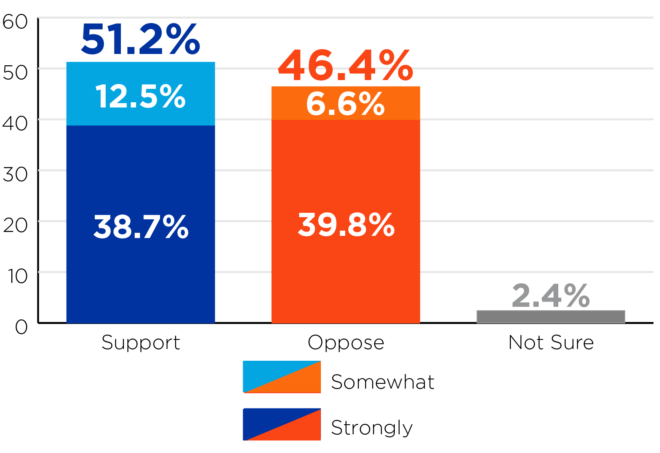
Finally, the survey turned to attitudes about a COVID-19 vaccine, focusing on whether people would get a vaccine if it were available today. Survey responses were collected about a week before any COVID-19 vaccines were approved by the Federal Drug Administration, but after data on their effectiveness was released. A majority (55%) report they would either definitely or probably get the vaccine, 38% say they would definitely or probably not get the vaccine. These numbers are similar to national sentiments during the same time period. Democrats are more likely to want the vaccine if available today than Republicans (77% vs. 45%). Idahoans over the age of 65 are somewhat more likely to want the vaccine than Idahoans ages 18-39 (65% vs. 55%).
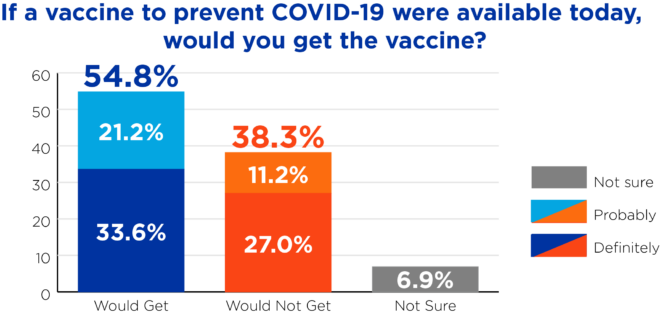
When asked the biggest reason for not planning to get the vaccine, respondents were most concerned about side effects (45%). Other common reasons include not believing they need it (27%), wanting to know more about its effectiveness (23%), and cost (2%).
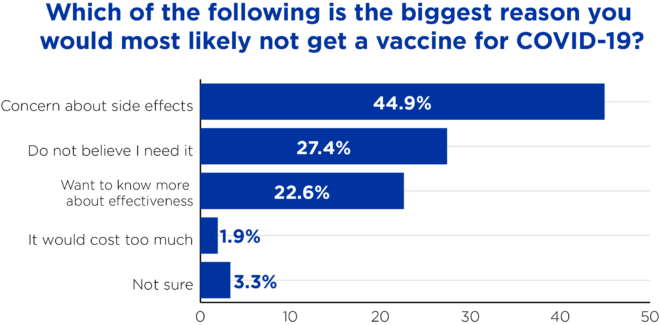
Taxes and Budget
Prior to the survey, the State of Idaho was on track to have a budget surplus of $530 million for the fiscal year. Idahoans were asked which would be the best use of surplus dollars: tax relief, increased funding for state services, or putting the money in a rainy-day fund. The most frequent response was tax relief, with 43% saying the surplus should be used to reduce taxes and help Idahoans make it through these difficult times. Increasing funding for critical state services like education and transportation was the second-highest response (34%). Only 19% of Idahoans believe the surplus should be put into a rainy-day fund to prepare for potentially worse economic conditions in the future. Democrats prefer increased funding for state services (49%), while Republicans (45%) and Independents (43%) favor tax relief.
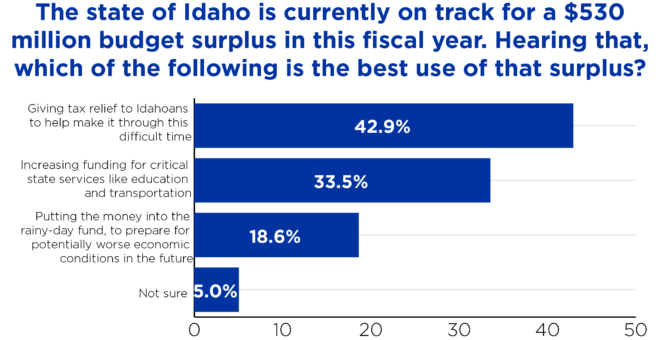
Idahoans were asked which state services should receive surplus funding. About half (51%) indicated increasing K-12 public education is the best use, while nearly a quarter (24%) support funding transportation projects like roads, highways, or bridges. Securing water for sustainable agriculture (13%) and increasing broadband internet access (8%) were less common answers. Support for increased education spending is particularly strong among Democrats (69%) and Independents (57%), but less pronounced among Republicans (39%). Support for transportation is lower across all parties: 33% of Republicans, 19% of Independents, and 15% of Democrats.
When asked to specify which kind of tax relief would be preferred, 42% of Idahoans prefer income tax relief, 34% prefer property tax relief, and 18% like sales tax relief.
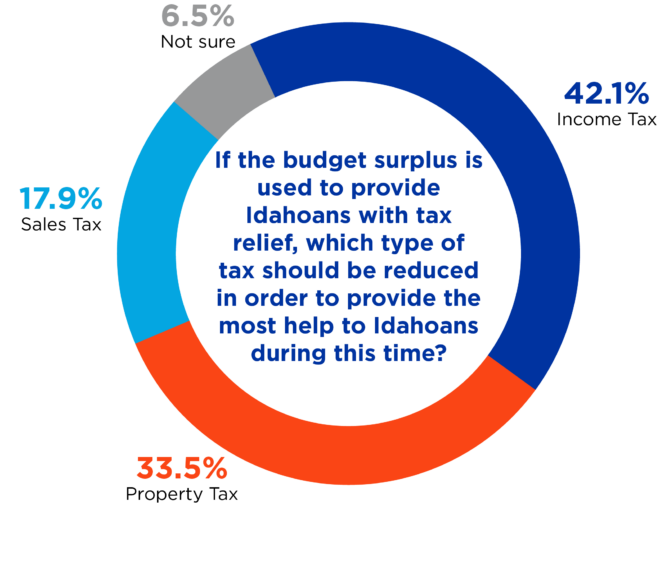
Property tax reform has been a topic of discussion in recent years, so people were asked if they thought property taxes in Idaho were too high, too low, or about right. Idahoans are split in thinking property taxes are too high (41%) or about right (44%). The most common concern relative to property tax is the unpredictability of the tax due to increasing home values (43%). Fewer respondents feel concern about tax changes from additional bonds and levies from schools and other taxing districts (16%), the limit of the homeowner’s exemption (9%), and increases in the budgets of local governments (9%). A small number of Idahoans (15%) have no concerns relating to property tax.
Education
The survey asked respondents about the quality of K-12 schools both in the state as a whole and in the area where they live. The perceived quality of schools in the state is split between fair (34%), good (30%), with smaller shares seeing quality as poor (23%) and excellent (5%). These numbers are similar to prior years, with a slight increase in the percent who see schools as good, and a slight decrease in the percent who see them as poor. Almost half (43%) of Republicans see schools across the state as good or excellent, while only 31% of Democrats share that belief. Parents with children in K-12 feel better about schools (43% good or excellent) than those with no children currently in school (29% good or excellent).
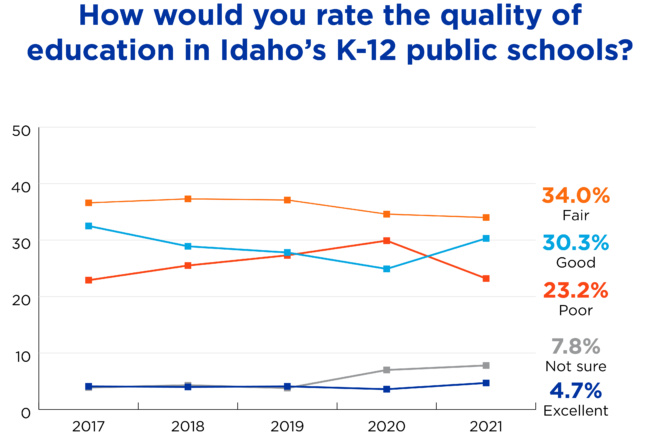
Perceptions of schools in the area of where people live are more positive. Most respondents feel their local schools are either good (36%) or excellent (10%). 17% of respondents feel their schools are poor, while 27% feel they are fair. No substantial differences exist between Republicans and Democrats in how they view their local schools. Parents with children currently enrolled in K-12 schools are more positive (55% say good or excellent) than those with no children in K-12 schools (40% good or excellent).
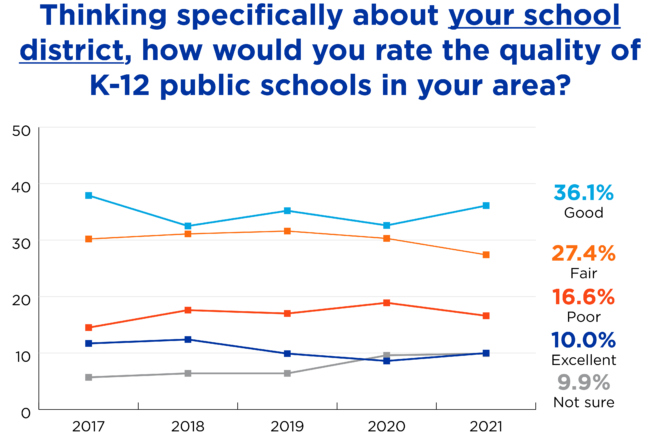
Respondents were presented five ways the state could spend money on education: helping high-need families, expanding apprenticeships for high school students, addressing early literacy losses from the pandemic, providing additional materials to teachers to help navigate the COVID-19 crisis, and making higher education more affordable.
Helping families with high-need (23%) and expanding access to apprenticeships (22%) are the most frequently cited options, but addressing learning loss from the pandemic (18%) is similarly popular. Providing additional resources for teachers (16%) and making higher education more affordable (13%) are the least popular options. The most popular investment with Democrats is helping high-need families (28%), while the most popular with Republicans was expanding access to apprenticeships (29%). There are not sizeable differences between parents of current K-12 students and non-parents, though parents are slightly more likely to prefer addressing learning losses caused by the pandemic (22%) than non-parents (15%).
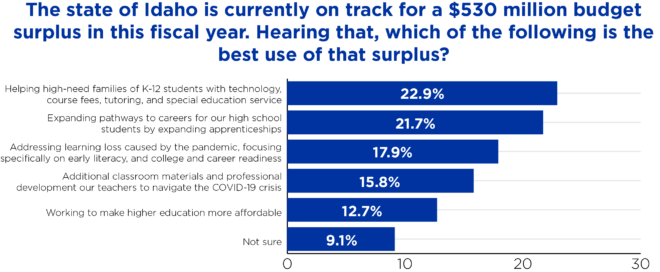
Criminal Justice
Several questions pertaining to criminal justice were asked, with a focus on the goals of rehabilitation and/or punishment. First, the survey sought to understand what Idahoans’ priorities for the criminal justice system should focus on when dealing with nonviolent criminals. Respondents were offered four different choices and asked to identify which should be a priority: rehabilitating criminals, making payments to the victims for damages caused by their crimes, punishing criminals, and sending a message to would-be criminals.
A majority of Idahoans (54%) believe rehabilitating criminals is the top priority. Democrats overwhelmingly prefer rehabilitation as the top priority (77%), and while Republicans are more divided among the options presented, rehabilitation was the most frequently selected (38%). Making payments to the victims is the second most common top priority (19%) and the most common second priority (42%). The remaining options were less popular, with 14% selecting punishing criminals as the top priority and only 6% chose sending a message to would-be criminals as the top priority.
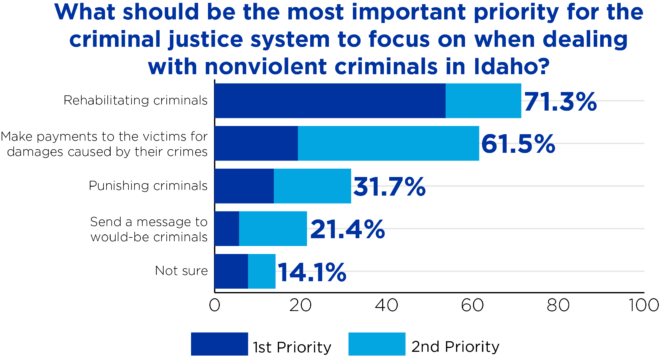
The survey asked if money should be invested into the prison system to keep offenders away from the public for longer or into education and treatment programs that may prevent recidivism. Half of the respondents were asked about first-time offenders and half were asked about repeat offenders.
For first-time criminal behavior, most respondents prefer to spend money on education and treatment programs (82%) instead of investing in the prison system to keep offenders away from the public for longer (10%). The preference for education and treatment programs is held by large majorities of both parties, 90% of Democrats and 76% of Republicans. For repeat criminal behavior, investing in education and treatment programs is still the most popular option (66%), though support falls by a significant margin from the question asking about first-time offenders. Republicans largely drive the drop in support of training and education for repeat offenders (51%), whereas Democrats remain supportive (84%).
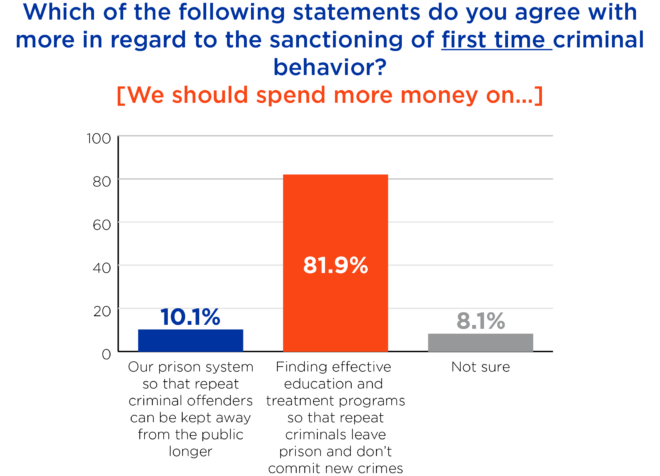
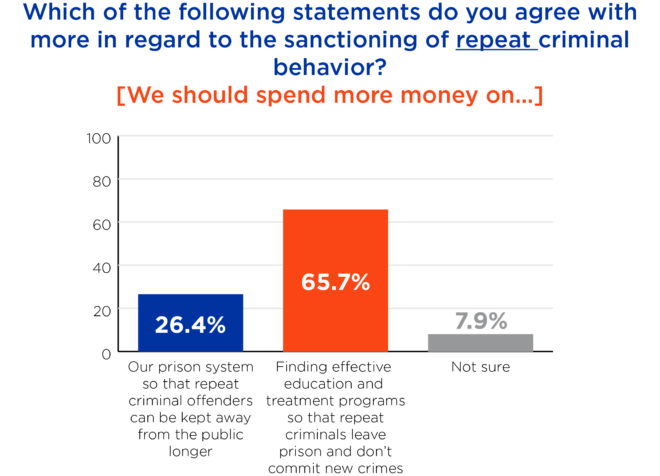
Elections
Finally, respondents were asked about perceptions of election security in Idaho. A large majority of Idahoans (76%) are not concerned about election security in the state, with a relatively small share (19%) responding that they do have concerns. Republicans are more likely than Democrats (26% vs. 7%) to have concerns about the security of Idaho elections, though sizeable majorities of both groups report feeling confident.
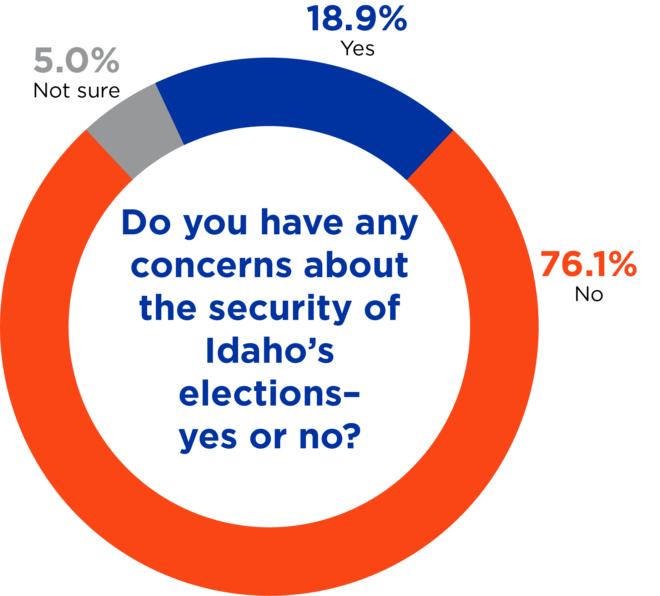
Those who reported concerns about election security cited the following reasons for concern: voter fraud (30%), issues with mail-in ballots (24%), misinformation (11%), security of voting machines (10%), and accuracy of vote tallying (7%).
An overwhelming majority of Idahoans (87%) are confident votes are counted as voters intend and a relatively small share (11%) are not confident. Large majorities of both Republicans (85%) and Democrats (91%) are confident votes are counted as voters intend.
This sixth annual iteration of the Idaho Public Policy Survey explored Idahoans’ attitudes on issues we have explored in the past such as the economy, education, taxes and budget, and elections, as well as new problems such as the COVID-19 pandemic. Despite the unique challenges faced by Idaho in 2020, more Idahoans remain positive about the direction the state is headed than believe the state is on the wrong track. However, challenges remain including a clear division among Idahoans in regard to certain issues including surplus spending and COVID-19. Understanding the attitudes of Idahoans can help inform the choices that lay ahead as leaders and decision makers tackle these matters in 2021.
Let us know how we can help you! To support these surveys or to inquire about how we can conduct a survey for your organization, please contact: Dr. Andrew Giacomazzi Interim Dean of the School of Public Service agiacom@boisestate.edu